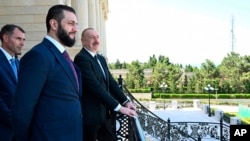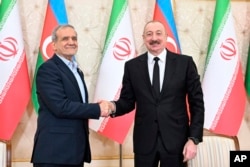Welcome back to the Farda Briefing, an RFE/RL newsletter that tracks the key issues in Iran and explains why they matter.
I'm RFE/RL correspondent Kian Sharifi. In this edition, I’m looking at why Iranian media are sounding the alarm over growing ties between Azerbaijan and Syria—one closely aligned with Israel, the other no friend of Iran.
What You Need To Know
• Azerbaijan And Syria Joining Forces… Against Iran?: Syrian interim President Ahmad al‑Sharaa’s surprise visit to Baku last weekend has set off alarms in Tehran and sent media from across the political spectrum scrambling to decode what it means for the region, especially Iran.
• Iranian Director Wins Prestigious Festival Prize: Iranian director Soheil Beiraghi’s film Bidad won the Special Jury Award at the 59th Karlovy Vary International Film Festival, despite nearly landing him in prison. The film, featuring women singing without hijabs, defies Iran’s strict rules on dress and performance. Beiraghi and his team faced sentences in Iran, later commuted to fines. Beiraghi told RFE/RL’s Radio Farda that he intends to return to Iran despite the legal threats. Accepting the award, he praised Iranian women’s strength, saying they deserve “appreciation, respect, and a standing ovation.”
• Tehran On Edge As Europe Threatens Return Of UN Sanctions: European powers have warned Tehran that UN sanctions could “snap back” if Iran fails to make verifiable nuclear commitments by the end of August. Ali Vaez, the director of the Iran program at the International Crisis Group, told Radio Farda that the ultimatum by Britain, France, and German is “very serious.” He added that they see the so-called “snapback mechanism” as crucial leverage to force inspections and revive talks. Iranian Foreign Minister Abbas Araqchi has warned that such a move would be treated like “a military attack.” Meanwhile, US President Donald Trump, citing June strikes on Iranian facilities, says he’s in “no rush.”
The Big Issue
A New Axis: Azerbaijan, Syria, And Possibly Israel?
Sharaa and Azerbaijani President Ilham Aliyev declared that years of stagnation in their relationship were over, blaming ousted Syrian President Bashar al‑Assad’s “unfriendly policy.”
They unveiled a deal to export Azerbaijani gas to Syria through Turkey, hailing it as a step toward alleviating Syria’s long‑running energy crisis.
Iranian media are sounding alarms over what they claim is a growing security threat along their country's northern and western borders.
Why It Matters: For Tehran, the stakes are high.
The possibility of Syrian militant networks shifting northward, coupled with Azerbaijan’s deepening ties to Israel, suggests a new security headache on Iran’s northern frontier.
Iranian President Masud Pezeshkian has already pressed Aliyev to explain alleged Israeli drone incursions into Iranian airspace during June’s 12-day war between the two Middle Eastern countries -- accusations Aliyev firmly denied.
But with Baku now forging overt partnerships with Sharaa’s Syria and allegedly hosting back‑channel talks with Israel, Iranian media warn that Tehran could soon face a more coordinated axis of rivals on its doorstep.
Tehran isn’t just watching; it’s concerned and recalibrating.
What's Being Said: Arman‑e Melli, a pro‑reform paper, warned that Syria‑based fighters could be moved through Turkey into Azerbaijani bases -- a “mission,” it wrote, that might aim to “destabilize areas along the borders of Iran and Russia.”
The conservative Farhikhtegan suggested Sharaa is meeting US demands to reduce foreign fighters in Syria by redeploying them to Azerbaijan, potentially turning the country into a “strategic hub” for operations in the Caucasus or even settlement in Nagorno-Karabakh.
In response, Iran’s state-broadcaster-run Jam‑e Jam newspaper charged that meetings between Syrian and Israeli officials in Baku were “clear evidence” some neighbors, specifically Azerbaijan, Turkey, and Israel, are “shaping new dynamics that work against Iran’s interests.”
Expert Opinion: “Indeed a new Middle East: in six months, Syria has transformed from an Iranian vassal state to an independent actor, forging ties and cooperation with Azerbaijan -- a major ally of Israel and rival of Iran,” says Brenda Shaffer, an international energy and foreign policy specialist.
That's all from me for now.
Until next time,
Kian Sharifi
If you enjoyed this briefing and don't want to miss the next edition, subscribe here. It will be sent to your inbox every Friday.







